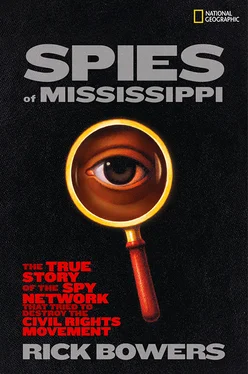Coleman appointed his former campaign publicity chief Hal DeCell to head up the unit. DeCell, editor of the weekly Deer Creek Pilot in the tiny delta town of Rolling Fork, had lobbied for a big public relations job with the state. He promised to repute the “vicious falsehoods” and “slanderous misrepresentation” coming from “antagonistic pressure groups,” the federal government, and the “poisoned pens” of the elite Yankee press. As public relations chief, DeCell began crafting the story line that segregation was good for both whites and blacks, and that most “Negroes” in the Magnolia State actually preferred it. He started sending pro-segregation editorials to newspapers across the country, developing a pro-segregation film, and distributing pamphlets that painted a glowing portrait of race relations in the state. DeCell escorted northern newspaper editors on tours of the Mississippi River and excursions to the tourist towns on the Gulf Coast in an effort to show that whites and blacks lived and worked in carefully controlled harmony in segregated Mississippi.
As would be expected, DeCell’s public relations package did not mention the state’s long history of maintaining white dominance over blacks, which dated to the earliest days of slavery. At that time the state established rigid “slave codes” that defined African Americans as property, dictated the conditions of their captivity, and prescribed brutal punishments for the slightest infractions. Even after the Civil War and the abolition of slavery, the ruling class in Mississippi—and throughout the South—retained power by establishing new laws, customs, and punishments that bore a striking resemblance to the old slave codes.
The new “black codes” restricted freedoms of speech, travel, voting, owning land, and choosing an occupation. White supremacy—the concept that white people are naturally superior to blacks—was written into law, taught in schools, praised in churches, and reinforced in the media. The laws and customs that propped up white power were commonly referred to as Jim Crow, after an old, crippled black character portrayed by white minstrel show performers. With their faces blackened by charcoal or burned cork, the minstrel showmen danced a ridiculous jig and sang a mocking song titled “Jump Jim Crow,” inadvertently putting a name to the degrading conditions that dominated the lives of African Americans.
The Mississippi State Sovereignty Commission had a plan to preserve Jim Crow. Its agents were going undercover.
 THE PIPELINE
THE PIPELINE
As the Commission’s propaganda machine ground out its self-serving distortions, Coleman decided to add to its arsenal.He began setting up a secret investigative unit that would be patterned after the FBI and U.S. military intelligence agencies during wartime, “seeking out intelligence information about the enemy and what the enemy proposed to do.” Specifically, Coleman wanted a small team of investigators to infiltrate the NAACP and to keep him apprised of its plans to form new chapters, to organize protest demonstrations, to boycott businesses, and to file lawsuits.
The governor began hiring investigators and assigned them to develop a network of paid and unpaid informants to serve as the Commission’s “eyes and ears” in communities statewide. The agents found willing collaborators in white civic leaders, businessmen, sheriffs, deputies, judges, and ministers. Determined to stop integration, the informants began calling the Commission’s office in the New State Capitol Building in Jackson. They reported conversations overheard between “Negro agitators,” rumors of upcoming protest actions, and the names and descriptions of suspected NAACP leaders in their midst. The Commission agents dubbed this network of neighborhood spies the “pipeline.”
Building the white information pipeline was easy compared to the task of recruiting blacks to inform on other blacks. But as one Commission report would conclude, “This problem will never be solved without the help of the Negroes in the state of Mississippi.” Seeking “a large number of fine, level-headed Negro citizens actively opposed to the NAACP,” the agents began quietly soliciting conservative black community leaders to serve as confidential informants. They offered payments of $10 to $500 per assignment to keep tabs on suspicious neighbors or to join the NAACP and send its meeting notes, plans, and member lists to handlers at the Commission.
At first, most black informants were small-time operators, but in spring 1957, agents began cozying up to Percy Greene, editor and publisher of the Jackson Advocate , the black newspaper with the largest circulation in the state. The word was that the outspoken, cigar-chomping newspaperman was uneasy with the NAACP’s demands for immediate school integration and felt out of step with its younger, more opinionated leaders. In addition, Greene needed cash to shore up his financially strapped weekly newspaper and wasn’t choosy about his sources of income. The big-talking editor liked to brag that he’d take money from the devil if it meant selling more papers.
After a series of meetings with publicity chief DeCell, Greene made good on his boast and formed a devil’s bargain with the Commission. He would publish its propaganda in his newspaper and keep tabs on the NAACP. The Commission would cover his travel expenses to out-of-state meetings and funnel money to him under the guise of subscriptions, advertising, and printing jobs.
Greene hammered the NAACP in his columns and editorials, condemning its “vindictive speeches” against “responsible white people” and began funneling information to the Commission. And he made a handsome side income. In 1958 alone, Greene received $3,200 from the Commission—more than $31,000 in today’s money.
Shortly after wooing and winning Greene, the spies scored an even bigger prize. Reverend Henry Harrison Humes—one of the most influential African-American ministers in the state—agreed to serve as a confidential informant. Rev. H. H. Humes was the longtime pastor of New Hope Baptist Church in Greenville, editor of the weekly Delta Leader , and president of the 387,000-member Baptist State Convention, the largest black Baptist organization in Mississippi. Now he was riding a circuit of black churches across the Mississippi River Delta and building a loyal following through his powerful oratory and moral decrees. Humes had significant influence over ordinary churchgoers, a powerful voice in church affairs, and plenty of contacts within the NAACP.
A conservative black preacher supporting segregation was rare but not completely unheard of in Mississippi at that time. White community leaders often bestowed special status on “Negro preachers” for keeping politics out of the pulpit and keeping their flocks focused on the rewards of the afterlife rather than the shortcomings of the here and now. Black ministers who toed the line received contributions to their church funds, special relationships with white community leaders, and even a voice in state affairs. Humes was cut from that cloth.
As an informant, Humes proved himself by providing intelligence on NAACP recruitment in his hometown of Greenville. His first check was for a modest $29.76 for “investigations.” A February 11, 1957, memo recommended paying him $150 to spy on other black preachers at an upcoming regional ministerial meeting in Atlanta, because his report “could alert us to local situations.” Now the preacher was in a position to ingratiate himself with the state, to undercut his rivals within the NAACP, and to make serious money.
Читать дальше

 THE PIPELINE
THE PIPELINE










